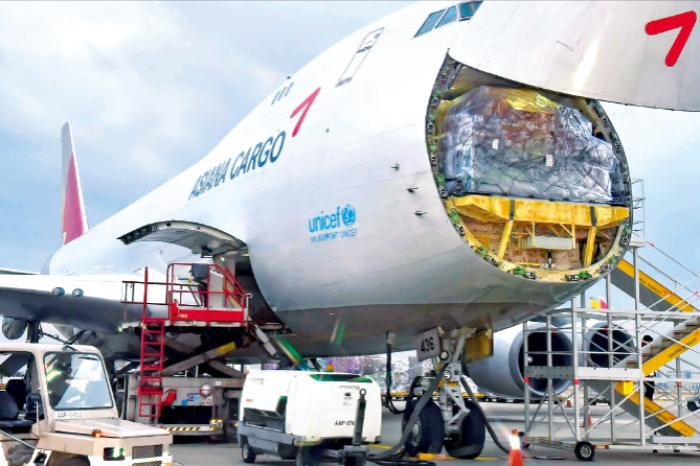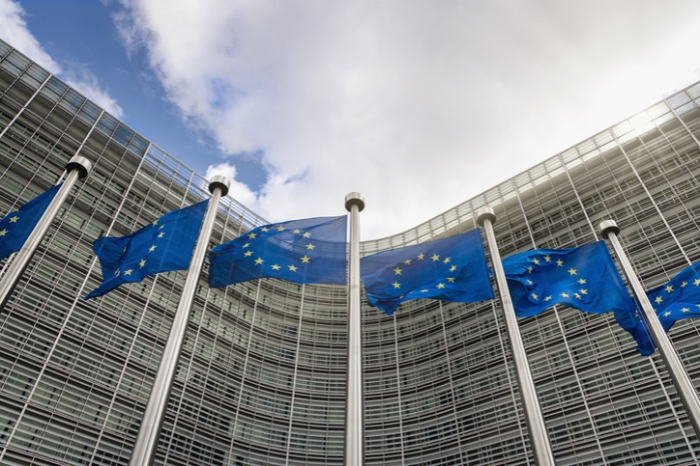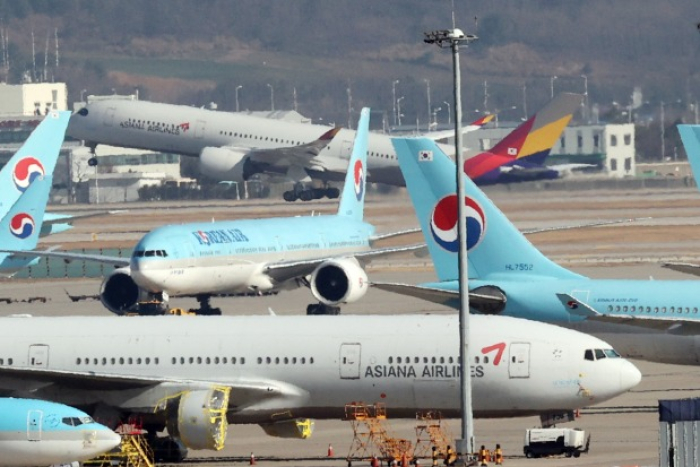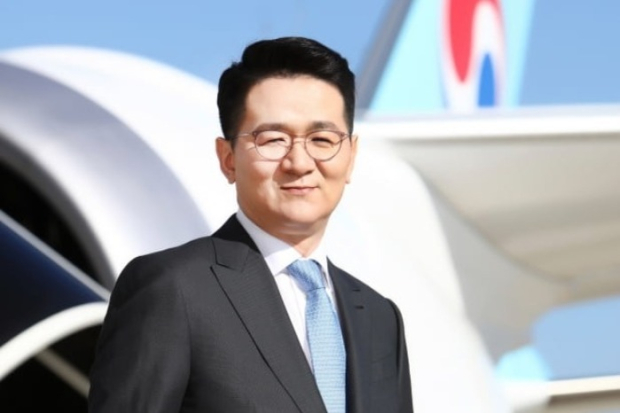Mergers & Acquisitions
Korean Air may give up Asiana’s cargo business, 4 routes for EU approval
S.Korea’s No. 1 full-service carrier will submit a revised plan to the EU this week on its merger with smaller rival Asiana Airlines
By Sep 25, 2023 (Gmt+09:00)
5
Min read
Most Read
LG Chem to sell water filter business to Glenwood PE for $692 million


KT&G eyes overseas M&A after rejecting activist fund's offer


Kyobo Life poised to buy Japan’s SBI Group-owned savings bank


StockX in merger talks with Naver’s online reseller Kream


Meritz backs half of ex-manager’s $210 mn hedge fund



Korean Air Lines Co. may give up the cargo business of Asiana Airlines Inc. and four of its lucrative routes in Europe in an all-in bet as the marriage of South Korea’s two largest full-service carriers has hit hurdles on monopoly concerns flagged by antitrust regulators in its key markets of Europe and the US.
According to sources in the airline and investment banking industries on Monday, Korean Air is expected to submit an amended plan to merge with its smaller local rival Asiana Airlines to the European Commission (EC), the antitrust body of the European Union, reviewing the Korean Air-Asiana Airlines union, on Wednesday.
The move comes about five months after the EC rejected the merger due to monopoly concerns following its preliminary review. The Commission was supposed to give its final say in August, but Korean Air has asked for more time to make some changes in their merger plan to reflect the antitrust regulator’s concerns.
Major changes include proposals to sell Asiana Airlines’ cargo business and yield four of its routes between Korea and Europe, which will likely be Incheon-Paris, Incheon-Frankfurt, Incheon-Rome and Incheon-Barcelona, according to sources.
The new plan addresses most of the EC’s primary concerns about the two Korean major airlines’ union.
The Commission preliminarily rejected the deal in May, saying in a statement that the merger “may reduce competition in the provision of passenger transport services on four routes between South Korea and France, Germany, Italy and Spain and reduce competition in the provision of cargo transport services between all of Europe and South Korea.”
But it is uncertain whether the EU will accept the new offer by Korean Air and approve the deal.

Even if the EU approves it, the deal would come at a huge cost, and could meet opposition from Asiana Airlines’ board of directors and main creditor Korea Development Bank (KDB), a state-run bank that has injected a combined 1.2 trillion won ($896.2 million) into Korean Air with other creditors on the condition of the two airlines’ merger.
NO MERGER SYNERGY, WEAKER COMPETITIVENESS
The marriage of Korea’s No. 1 and No. 2 air carriers was pushed ahead on expectations that it would not only resuscitate debt-ridden Asiana Airlines but also bolster the competitiveness of the national airline industry.
However, given the fact that Korean Air has already transferred its seven weekly takeoff and landing slots at Heathrow Airport in London to Virgin Atlantic to gain the nod from the UK and yielded 46 slots in China for the merger, giving up four lucrative European routes would further impair the merged airline’s competitiveness, analysts concerned.
Korean Air is even considering handing in its slots at airports in New York and San Fransisco to gain US approval for the deal.
Yielding Asiana Airlines’ cargo business, which has emerged as the ailing airline’s main cash cow since the COVID-19 pandemic, would also weaken the anticipated synergy effect from the merger.
Asiana Airlines raked in 3 trillion won in sales from its freight business last year, accounting for more than half of the airline’s total revenue of 5.6 trillion won. Combined with Korean Air’s 7.7 trillion won in cargo sales, their total annual revenue from the freight business exceeded 10 trillion won.

“Korea’s top two carriers’ union was anticipated to create great synergy in both passenger and cargo flying,” said an unnamed official from the Korean airline industry. “But if they give up the cargo business and sell off the lucrative routes to foreign rivals, it would harm Korea’s national competitiveness in the aviation industry.”
It is also expected to be hard to persuade Asiana Airlines’ board of directors to abandon its moneymaking cargo business.
ULTIMATUM TO STOP LOSS
Despite such concerns, Korean Air Lines Chairman and Chief Executive Officer Cho Won-tae seems to have no plan to back off on the merger.
“We have staked 100% on the Korean Air-Asiana merger,” Cho said in an interview with Bloomberg at this year’s Annual General Meeting of the International Air Transportation Association in Istanbul, Turkiye in June. “We will make it happen no matter what we have to give up.”
Cho is known to be persuading KDB and Korean Air officials to be bold in addressing other nations’ demands to make the merger happen.
If the deal falls through, Cho could lose its strong white knight, KDB, which would be a big threat to his grip on the Korean transportation behemoth.
The delayed deal for three years has been also hampering both airlines’ competitiveness on the global stage.
Korean Air in November 2020 agreed to buy a majority stake in Asiana Airlines for 1.8 trillion won in a deal that was expected to create the world’s seventh-largest airline.

It initially planned to complete the acquisition by the end of the first half of 2021 and launch the merged entity in 2022.
OFF ON THE RIGHT FOOT
The EU’s decision is important because it is expected to affect the US antitrust agency’s ruling.
The US Department of Justice (DOJ) in May notified Korean Air it would block the deal if it leads to the creation of the dominant player without a formidable rival in the Korean aviation industry and demanded the Korean airline to come up with remedies to prevent it.
The deal has passed or its review has been completed in 11 countries including Korea, but its approval is pending in the EU, the US and Japan. If one of the three vetoes the merger, Korean Air and Asiana Airlines cannot be placed under one roof.
“We are working closely with the EC for correctional measures to ease concerns about reduced market competition,” said an official at Korean Air. “We can’t disclose details about our talks but we will do our utmost to complete our talks in an amicable way and gain the final nod.”
After Korean Air submits its amended merger plan to the EC this week, the Commission is projected to make its final decision on a conditional merger of the two Korean airlines in January next year at the earliest after its review.
Korean Air has postponed the deadline to acquire stakes in Asiana Airlines by up to three months from the original deadline of Sept. 30.
Write to Jun-Ho Cha and Jae-Fu Kim at chacha@hankyung.com
Sookyung Seo edited this article.
More to Read
-
 Mergers & AcquisitionsKDB girds up for Korean Air-Asiana deal collapse with Plan B
Mergers & AcquisitionsKDB girds up for Korean Air-Asiana deal collapse with Plan BAug 07, 2023 (Gmt+09:00)
4 Min read -
 AirlinesKorean Air’s operating profit falls to $360 mn in Q2 2023
AirlinesKorean Air’s operating profit falls to $360 mn in Q2 2023Aug 03, 2023 (Gmt+09:00)
1 Min read -

-
 AirlinesKorean Air says it can conclude Asiana takeover via big concessions
AirlinesKorean Air says it can conclude Asiana takeover via big concessionsJun 07, 2023 (Gmt+09:00)
1 Min read -
 AirlinesUS antitrust body blocks $1.4 bn Korean Air-Asiana deal
AirlinesUS antitrust body blocks $1.4 bn Korean Air-Asiana dealMay 22, 2023 (Gmt+09:00)
4 Min read -

-

Comment 0
LOG IN


